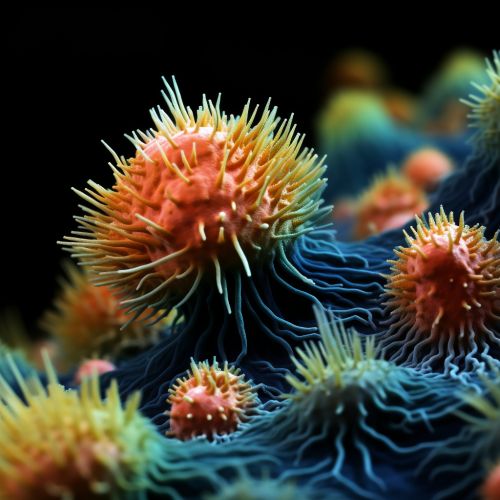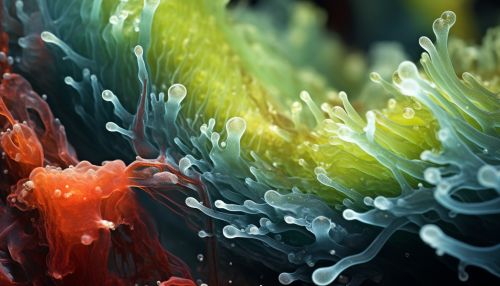Actinobacteria
Overview
Actinobacteria are a phylum of Gram-positive bacteria. They can be terrestrial or aquatic, living in the soil and water, and are also present in the microbiota of humans and other animals. They are of great importance due to their complex secondary metabolism. They are prolific producers of antibiotics, and can produce a large variety of natural products that are of significant biological activity. They have a high guanine and cytosine content in their DNA.
Classification
The Actinobacteria are a large phylum of bacteria that includes some of the most common soil life, marine life, and freshwater life, as well as some human pathogens. The Actinobacteria are divided into six subclasses: Actinobacteridae, Acidimicrobidae, Rubrobacteridae, Coriobacteridae, Nitriliruptoridae, and Bifidobacteriidae.


Morphology
Actinobacteria are usually shaped like rods or filaments. They are known for their high guanine and cytosine content in their DNA. The filamentous cells, similar to the related group of organisms, the fungi, are multicellular, with cells specialized for different functions. Some Actinobacteria form branching filaments, which can produce chains of spores, while others form complex, branched structures.
Metabolism
Actinobacteria are capable of a wide range of metabolic activities, including the degradation of a variety of substrates, nitrogen fixation, and various types of anaerobic respiration. They are noted for their ability to degrade a wide array of organic compounds, and are often used in bioremediation efforts to clean up sites contaminated with pollutants. They are also capable of producing a wide range of bioactive compounds, including antibiotics, antifungals, and antitumor agents.
Role in Soil
Actinobacteria play a vital role in soil ecosystems. They are responsible for the breakdown of organic material, which helps to maintain the global carbon cycle, and also helps to suppress disease in certain plants. Some species are able to degrade complex organic compounds, such as lignin and chitin, which are common in soil, while others are able to fix nitrogen from the atmosphere, a crucial process in the nitrogen cycle.
Role in Human Health
Actinobacteria are found in the human microbiota, particularly in the mouth, skin, and gut, where they are thought to have various roles in human health. Some species are beneficial to human health, including Bifidobacterium, which is often used as a probiotic. Other species are responsible for diseases, such as acne, caused by Propionibacterium, or tuberculosis, caused by Mycobacterium.
Antibiotic Production
Actinobacteria are noted for their ability to produce a wide range of bioactive compounds, including antibiotics. In fact, more than half of the naturally derived antibiotics are produced by this phylum. These include aminoglycosides, anthracyclines, chloramphenicol, macrolide, tetracyclines, and many others. The ability of Actinobacteria to produce these compounds is thought to be due to their complex secondary metabolism.
